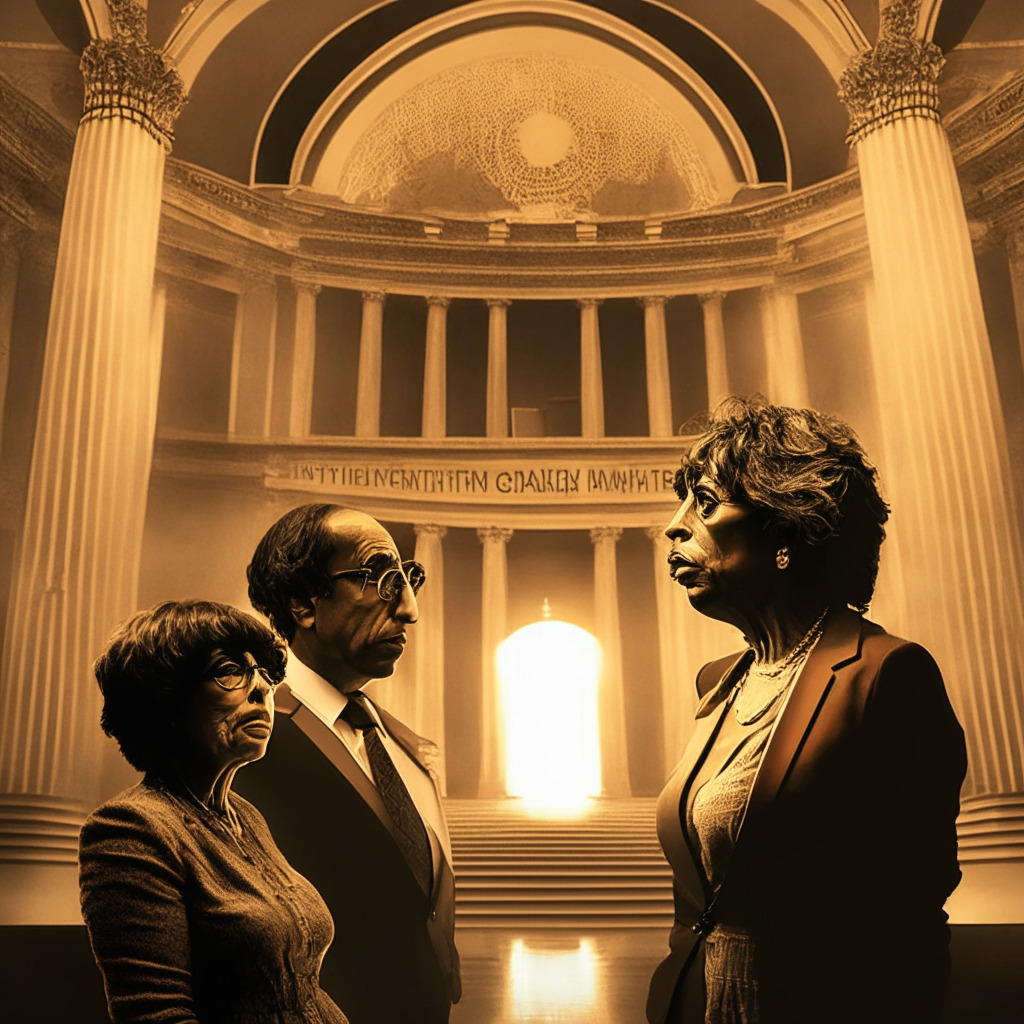Senator Cynthia Lummis filed an Amicus Brief supporting Coinbase’s initiative to dismiss the SEC lawsuit, arguing the SEC is using its lawsuit to control the growing cryptocurrency sector, bypassing Congress’s role. The SEC’s approach could bring digital assets under its scope, categorizing them as securities and bypassing other agencies’ authority, which critics regard as overstepping its jurisdiction.
Search Results for: U.S. Congress
Unleashing Stablecoins: Assessing PayPal’s PYUSD Launch Amid Political Divides and Regulatory Turbulence
“PayPal’s recent launch of its stablecoin, PYUSD, under the regulatory framework of the New York Department of Financial Services has stirred conversations about stablecoin adoption. Unlike Meta’s unsuccessful Libra, PayPal’s project is viewed more favorably politically, indicating an imminent regulatory framework for stablecoins in the U.S.”
Navigating the Cryptoregulatory Waters: PayPal’s Launch of PYUSD Sparks Debate
“PayPal’s launch of its own stablecoin, PYUSD, brings the pressing issue of cryptocurrency regulation into focus. As cryptocurrencies integrate into mainstream financial services, there’s growing consensus on the need for a well-defined regulatory framework that can oversee these innovations while ensuring consumer protection and financial system integrity.”
The Great Swindle: FTX’s Co-CEO’s Guilty Plea and Its Fallout on Crypto Transparency
Former co-CEO of FTX Digital Markets, Ryan Salame, is expected to plead guilty to suspected violations of U.S. campaign finance laws linked with illicit activities within the cryptocurrency firm. Sam Bankman-Fried, FTX founder, maintains his not guilty plea against charges including multi-billion dollar fraud. This underscores the urgent need for transparency in financial cyberspace.
Influx of Counterfeit PYUSD Tokens: A Hazard or Humor in the Crypto World?
The launch of PayPal’s new stablecoin, PYUSD, has led to the creation of numerous counterfeit tokens across various blockchain platforms. Investors must be cautious as these imitation tokens could be traps that result in losses, underlining the importance of due diligence before investing.
The SEC’s Covert Crusade Against US Crypto: Potential Collapse or Global Shift?
The U.S. Securities and Exchange Commission’s (SEC) changes in regulatory policies could be sabotaging the resurgence of the blockchain industry. The new rules, perceived by some as covert attempts to regulate crypto out of existence, have led to startups moving offshore and riskier investments for U.S. investors. The shift towards a more merit-based regulatory role by the SEC threatens to restrict financial open-source software and could disqualify operators like Fidelity Digital Assets from acting as custodians.
Ripple Landmark Verdict: A Turn of Tides for Crypto Legal Landscape or a Ripple in the Ocean?
The recent verdict on the Ripple lawsuit is a pivotal moment in crypto industry, marking the distinction between an investment contract and the underlying asset. The Chamber of Digital Commerce anticipates the ruling will support future endeavors in the digital asset sector while advocating for comprehensive legal frameworks.
Regulatory Tug-of-War: The Coinbase vs SEC Saga and Future of Crypto Governance
“The ongoing legal case between Coinbase and the SEC pertains to whether certain cryptocurrency transactions consitute “investment contracts” as per Howey Test specification, or if Coinbase acted as an unregistered broker. This case tests the balance between regulatory oversight and innovative freedom, showing tension that exists between autonomous crypto systems and regulatory bodies.”
Legal Drama Surrounds FTX Founder: Federal Scrutiny, Witness Tampering, & Crypto Regulation Unfolding
FTX founder, Sam Bankman-Fried, is under federal scrutiny accused of sharing potentially inflammatory documents to manipulate a fellow FTX executive’s testimony. Prosecutors call for his detention but his defense disputes, citing First Amendment rights. The case revolves around defining “tampering”, while shedding light on instances of witness intimidation.
Ripple vs Terraform: The Impact of Legal Battles on Crypto Regulation Future
In an important ruling, U.S judge Jed Rakoff denied dismissal motion for the Terraform Labs case, reflecting a trend towards stricter legal punishments in the crypto community. This adds complexity to the ongoing discussion on cryptocurrency regulation and congressional involvement in cryptosphere’s regulatory dynamics.
Cryptocurrency Crossroads: Santos Scandal Meets RFK Jr’s Bitcoin Vision
“The Santos incident reveals a complex intertwining of political intrigue, crypto manipulation, and scams, while figures like Robert F. Kennedy Jr. demonstrate a supportive stance towards cryptocurrency. This highlights the intersection of politics, regulation, and digital finance in unanticipated ways.”
Stablecoins Disrupting Financial System: Are They Really Riskier than Bank Deposits?
According to former Federal Reserve Board analyst, Brendan Malone, stablecoins are less risky than bank deposits and are not akin to money market funds. He argues that stablecoins, backed by fiat currencies and typically short-dated Treasuries, do not pose similar risks as banks due to the absence of mismatches between short-term liabilities and long-term assets. Regulating stablecoins similarly to traditional financial entities could, however, limit competition and increase market dominance.
Navigating the Crypto Landscape Amid Regulatory Tumult: A Case for Proactivity and Diligence
“Amidst regulatory uncertainty, the cryptocurrency sphere calls for a more pragmatic approach grounded in know-how and thoughtful consideration. Adopting a traditional finance framework for cryptocurrencies, a focus on due diligence initiatives, and regulatory technology (regtech) are crucial. Prioritizing fraud prevention is non-negotiable for trust and credibility in the expanding crypto ecosystem.”
Federal Reserve’s CBDC Hunt: A Financial Death Star or Leap Towards Progress?
“The San Francisco Federal Reserve Bank’s job posting for a “senior crypto architect” has sparked criticism. There are concerns CBDCs could be misused as tools for coercion and control. Representatives like Warren Davidson contend CBDCs should prioritize being a stable store of value and an efficient means of exchange, rather than being used for surveillance and control.”
Rally Against CBDCs: Freedom Fighters or Innovation Obstructors?
U.S. Republican Representative, Warren Davidson, has appealed to Congress to ban Central Bank Digital Currencies (CBDCs), equating their creation to “building the financial equivalent of the Death Star.” Davidson argues that CBDCs convert money into a tool for coercion and control, rather than a stable store of value. Counterarguments maintain that CBDCs represent the natural evolution of digitizing finance. The debate underscores the need for well-regulated, informed approaches to digital finance’s future.
Nasdaq Pulls the Plug on Crypto Custody Service: Regulatory Challenges or a Missed Opportunity?
“Nasdaq has terminated plans to launch a cryptocurrency custody service due to recent regulatory challenges. Despite the setback, CEO Adena Friedman confirms Nasdaq will continue supporting advancements in the digital asset ecosystem. This highlights broader tension within the financial industry around cryptocurrency regulations.”
Navigating the Regulatory Minefield: Coinbase CEO’s Impending Meeting with House Democrats
Brian Armstrong, CEO of Coinbase, is expected to meet with U.S. House Democrats to discuss digital-asset legislation covering tax, national security, privacy, and the environment. The complex interplay of commerce, technology, and regulatory policy is generating discourse on crypto regulation.
Ripple’s Partial Victory and the Complex Dance of Crypto Regulations: A Regulatory Tug-of-War
“The Ripple’s XRP token case indicates the evolving complexities in blockchain regulations, with the token classified as a non-security for digital asset exchanges but not for institutional investors. This dual classification signifies future regulatory challenges, but also presents opportunities for increased investor protection and transparency in the crypto sector.”
Unexpected Ripple Labs Victory: A Setback for SEC or a Starting Point for Crypto Legislation?
“A Federal Judge contended that the SEC’s case against Ripple Labs was deficient, significantly impacting the narrative around securities regulation in the crypto industry. This judgement doesn’t label Ripple’s XRP as a security, but questions the SEC’s success in regulating crypto. Urgency arises for clear regulatory framework in line with technology.”
Binance: Navigating Through Regulatory Storms and Workforce Downsizing – A Future at Stake?
“Binance, the world’s largest cryptocurrency exchange, is undergoing a major staff downsizing, impacting over 1,000 employees. This is amidst ongoing regulatory challenges worldwide, and raised skepticism about Binance’s future. Will this lead to Binance’s resurgence or fulfill its skeptics’ predictions? Time shall offer the final verdict.”
Regulating Digital Assets: The SEC’s Paradox, Investor Protection versus Technological Growth
Congressman Ritchie Torres criticizes SEC’s inconsistent approach to digital assets, highlighting the dubious licensing of a particular trading platform. Torres questions if this strict regulatory approach is protecting investors or hindering technological innovation, emphasizing the need for a balance between regulation, investor protection, and progress in digital asset market.
Coinbase vs SEC: How a Supreme Court Ruling Could Impact Future Cryptocurrency Regulations
In facing litigation with the U.S. Securities and Exchange Commission (SEC), Coinbase draws parallels with a recent Supreme Court judgment on student debt cancellation. The cryptocurrency platform is challenging the SEC’s regulatory authority over digital assets, highlighting the lack of ‘clear congressional authorization.’ This lawsuit could significantly impact cryptocurrency regulations and the digital asset industry.
Supreme Court Ruling on Student Debt Sparks a Legal Battle in the Cryptosphere
Coinbase is facing charges from the SEC, which the crypto heavyweight claims is an attempt to extend control over the $1 trillion digital asset industry. Using a recent Supreme Court ruling, which underlined that government agencies need explicit legislative backing for major decisions, Coinbase argues the SEC doesn’t have the power it’s trying to assert.
Bitcoin’s Revival Amid Inflation Fears: A Rally to $50,000 or a Fall into Recession?
“Bitcoin soared above $31,000 indicating a recovery of investor enthusiasm after June’s bitcoin ETF filings by financial titans. Fears around inflation have eased, contributing to this recovery. British multinational bank, Standard Chartered, predicts bitcoin to reach $50,000 by 2022’s end. Major events are anticipated to influence the crypto market’s future stability.”
Unraveling the Prometheum Probe: A Case of Cryptocurrency, Regulation, and Transparency
U.S. Senator Thomas Tuberville has urged an investigation into special-purpose broker, Prometheum, which recently got federal permissions to offer crypto trading. The probe stems from the suspicion that Prometheum may have violated U.S. securities laws or provided dubious testimony to Congress, hence affecting investor protection and legislative process integrity.
How Celebrity Endorsements are Shaking Up the Crypto World: A Tale of Fame Vs. Regulation
“Celebrities like Tom Brady face backlash and potential legal issues due to their endorsements of now-defunct crypto exchange FTX. Regulatory bodies are scrutinizing undisclosed promotions of crypto tokens, attempting to balance security regulations with the lure of stardom in the crypto universe.”
Coinbase v. SEC: A Battle for Crypto Regulatory Clarity or Arm-Wrestling for Power?
Coinbase challenges the U.S. SEC stating it lacks jurisdiction to take enforcement actions against it, alleging Coinbase listed unregistered securities. Coinbase refutes this, claiming virtual currencies on its platform do not qualify as securities and it operates as a secondary market. The ongoing legal tussle underscores the need for clearer regulatory guidance in the digital asset industry.
Digital Asset Market Structure: A Path for Crypto Regulation or Hindrance to SEC’s Authority?
House Financial Services Committee Chair Maxine Waters proposed the Digital Asset Market Structure bill, offering US-based digital asset exchanges a pathway for SEC registration, seeking regulatory clarity for the crypto industry. The legislation aims to approve digital securities, commodities, and stablecoins for trading while providing guidelines to distinguish between crypto-based securities and commodities.
CFTC Reviews Kalshi’s Political Betting Contracts: Why the Decision is Controversial
The U.S. CFTC has initiated a formal review and public comment period to examine prediction market Kalshi’s proposed contracts for betting on political party control of Congress. This development highlights the ongoing debate surrounding prediction markets and their place in the broader financial landscape, as regulators aim to balance opinions and concerns.
Binance Brazil Director Summoning: Pyramid Scheme Suspicions & Global Regulatory Crackdowns
The Brazilian parliament may soon summon Guilherme Haddad, director of Binance Brazil, amid investigations into alleged pyramid schemes involving cryptocurrencies. Binance faces growing regulatory scrutiny worldwide, with Brazil investigating the exchange’s authorization for offering derivative market products since 2020.
AI Safety Legislation: Balancing Innovation and Public Trust in the Era of Artificial Intelligence
US Senate Majority Leader Chuck Schumer plans to call for comprehensive legislation regarding AI safety measures, emphasizing bipartisan action from Congress. Addressing safe innovation, privacy, biases, and misinformation, Schumer aims to ensure responsible and secure AI development while maintaining public trust in the technology.
National AI Commission Act: Balancing Innovation and Consumer Safety in AI Development
The National AI Commission Act, introduced by U.S. lawmakers, aims to establish a regulatory framework for AI technology by bringing together experts, government officials, industry representatives, and labor stakeholders to provide effective AI regulation, addressing concerns and potential risks associated with AI development and use.































